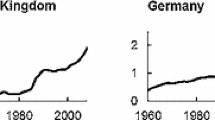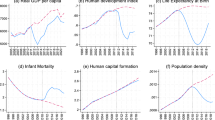Abstract
We use latent class models to correct measurement error in estimates of the dynamics of relative income poverty in ten EU countries measured over four waves of the European Community Household Panel. A latent mover-stayer Markov model gives an acceptable fit to all ten transition tables. We focus in more detail on four countries – Denmark, the Netherlands, Italy and the UK – and show that mobility in poverty transition tables is over-estimated by between 25 and 50 percent if measurement error is ignored. In addition, once error is corrected, poverty rates show less cross-national variation.
Similar content being viewed by others
References
Atkinson, A.B., Rainwater, L. and Smeeding, T.M.: Income distribution in OECD countries, OECD Social Policy Studies No. 18, OECD, Paris, 1995.
Atkinson, T., Cantillon, B., Marlier, E. and Nolan, B.: Social Indicators – The EU and Social Inclusion, Oxford University Press, Oxford, 2002.
Bane, M.J. and Ellwood, D.T.: Slipping into and out of poverty: The dynamics of spells, J. Human Resources 21 (1986), 1–23.
Bassi, F., Hagenaars, J.A., Croon, M.A. and Vermunt, J.K.: Estimating true changes when categorical panel data are affected by uncorrelated and correlated classification errors, Sociological Methods & Research 29(2) (2000), 230–268.
Blalock, H.M.: The measurement problem: A gap between the language of theory and research, In: H.M. Blalock, Jr. and A.B. Blalock (eds.), Methodology in Social Research, McGraw-Hill, New York, 1968, pp. 428–478.
Bound, J. and Krueger, A.B.: The extent of measurement error in longitudinal earnings data: Do two wrongs make a right? J. Labor Economics 9(1) (1991), 1–24.
Chiu, T.C. and Fuller, W.A.: A model for multinomial response error applied to labor flows, J. Amer. Statist. Assoc. 82(397) (1987), 46–51.
Coleman, J.S.: The mathematical study of change, In: H.M. Blalock, Jr. and A.B. Blalock (eds.), Methodology in Social Research, McGraw-Hill, New York, 1968, pp. 428–478.
Costner, H.L.: Theory, deduction, and rules of correspondence, Amer. J. Sociol. 75(2) (1969), 245–263.
Dempster, A.P., Laird, N.M. and Rubin, D.B.: Maximum likelihood from incomplete data via the EM algorithm, J. Roy. Statist. Soc. Ser. B 39(1) (1977), 1–38.
Duncan, G.J.: Household panel surveys: Prospects and problems, In: D. Rose (ed.), Researching Social Change: Household Panel Studies: Methods and Substance, UCL Press, London, 2000.
Duncan, G.J., Gustafsson, B., Hauser, R., Schmaus, G., Messinger, H., Muffels, R.J.A., Nolan, B. and Ray, J.-C.: Poverty dynamics in eight countries, J. Population Economics 6 (1993), 215–234.
Ekhom, A. and Palmgren, J.: A model for binary responses with misclassifications, In: R. Gilchrist (ed.), GLIM82: Proceedings of an International Conference on Generalised Linear Models, Springer-Verlag, New York, 1982, pp. 128–143.
Esping-Andersen, G.: The Three Worlds of Welfare of Capitalism, Princeton University Press, Princeton, 1990.
Eurostat: Structural Indicators, <URL> http://forum.europa.eu.int/irc/dsis/structind/info/data/index.htm, 2004.
Goldberg, J.D.: The effects of misclassification on the bias in the difference between two proportions and the relative odds in the fourfold table, J. Amer. Statist. Assoc. 70(351) (1975), 561–567.
Goodman, L.A.: The analysis of systems of qualitative variables when some of the variables are unobservable. Part I – A modified latent structure approach, Amer. J. Sociol. 79(5) (1974), 1179–1259.
Goodman, L.A.: Exploratory latent structure analysis using both identifiable and unidentifiable models, Biometrika 61(2) (1974), 215–231.
Hagenaars, J.A.: Exemplifying longitudinal log-linear analysis with latent variables, In: P.G.M. van der Heijden, W. Jansen, B. Francis and G.U.H. Seeber (eds.), Statistical Modelling, North-Holland, Amsterdam, 1992, pp. 105–120.
Heise, D.R.: Separating reliability and stability in test–retest correlation, American Sociological Review 34(1) (1969), 93–101.
Henry, N.W.: Measurement models for continuous and discrete variables, In: A.S. Goldberger and O.D. Duncan (eds.), Structural Equation Models in the Social Sciences, New York, Seminar, 1973.
Jarvis, S. and Jenkins, S.P.: Low income dynamics in 1990s Britain, Fiscal Studies 18(2) (1997), 123–142.
Kuha, J. and Skinner, C.: Categorical data analysis and misclassification, In: L. Lyberg, P. Biemer, M. Collins, E. de Leeuw, C. Dippo, N. Schwarz and D. Trewin (eds.), Survey Measurement and Process Quality, Wiley, New York, 1997.
Langeheine, R. and van de Pol, F.: A unifying framework for Markov modelling in discrete space and discrete time, Sociological Methods and Research 18 (1990), 416–441.
Layte, R. and Whelan, C.T.: Moving in and out of poverty: The impact of welfare regimes on poverty dynamics in the EU, European Societies 4(2) (2003), 209–233.
Lazarsfeld, P.F. and Henry, N.W.: Latent Structure Analysis, Houghton Mifflin, Boston, 1968.
Leisering, L. and Leibfried, S.: Time and Poverty in Western Welfare States: United Germany in Perspective, Cambridge University Press, 1999.
McCall, J.J.: A Markovian model of income dynamics, J. Amer. Statist. Assoc. 66(335) (1971), 439–447.
Organisation for Economic Cooperation and Development: Employment Outlook, OECD, Paris, 1999.
Peracchi, F.: The European community household panel: A review, Empirical Economics 27 (2002), 63–90.
Rendtel, U., Langeheine, R. and Berntsen, R.: The estimation of poverty-dynamics using different household income measures, Review of Income and Wealth 44 (1998), 81–98.
Rendtel, U., Nordberg, L., Jäntti, M., Hanisch, J. and Basic, E.: Report on quality of income data, CHINTEX Working papers, Federal Statistical Office Germany, 2004.
Rodgers, W.L., Brown, C. and Duncan, G.J.: Errors in survey reports of earnings, hours worked, and hourly wages, J. Amer. Statist. Assoc. 88(424) (1993), 1208–1218.
Sen, A.: Poor, relatively speaking, Oxford Economic Papers 35 (1983), 153–169.
Townsend, P.: Poverty in the United Kingdom, Penguin Books Ltd., Middlesex, 1979.
Van de Pol, F. and de Leeuw, J.: A latent Markov model to correct for measurement error, Sociological Methods and Research 15(1–2) (1986), 118–141.
Van de Pol, F. and de Langeheine, R.: Mixed Markov latent class models, Sociological Methodology 20 (1990), 213–247.
Vermunt, J.K.: LEM: A General Program for the Analysis of Categorical Data, Tilburg University, The Netherlands, 1997.
Visser, J. and Hemerijck, A.: ‘A Dutch Miracle’ Job Growth, Welfare Reform and Corporatism in the Netherlands, Amsterdam University Press, Amsterdam, 1997.
Whelan, C.T., Layte, R., Maître, B. and Nolan, B.: Poverty dynamics: An analysis of the 1994 and 1995 waves of the European community household panel, European Societies 2(4) (2000), 505–531.
Wiley, D.E. and Wiley, J.A.: The estimation of measurement error in panel data, American Sociological Review 35(1) (1970), 112–117.
Author information
Authors and Affiliations
Rights and permissions
About this article
Cite this article
Breen, R., Moisio, P. Poverty dynamics corrected for measurement error. J Econ Inequal 2, 171–191 (2004). https://doi.org/10.1007/s10888-004-3227-9
Received:
Accepted:
Issue Date:
DOI: https://doi.org/10.1007/s10888-004-3227-9




